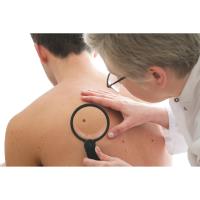Given that one in five Americans will develop skin cancer by age 70, it’s crucial to understand the basics of skin cancer so you can monitor your own skin for changes. Let’s review the essentials of four types of skin cancer: melanoma, squamous cell carcinoma, basal cell carcinoma, and Merkel cell carcinoma. The positive news is that early detection and treatment by a dermatologist can often eradicate skin cancer with minimal scarring.
In essence, skin cancer occurs when cells in the epidermis, the outer skin layer, grow uncontrollably due to DNA damage, leading to mutations. These cells then form malignant tumors. The primary causes of skin cancer are the sun’s harmful UV rays and UV tanning beds, so protecting yourself from the sun and avoiding tanning booths are key preventive measures.
Melanoma
Melanoma arises when melanocytes, the skin cells that produce the pigment melanin, grow uncontrollably. Melanoma is the most dangerous type of skin cancer because it can spread to other organs. In 2021, there were over 207,390 new cases. Melanomas often resemble moles and can appear anywhere on the body, even in areas not usually exposed to the sun. While sunburns and tanning beds are common causes, melanomas can develop in sun-protected areas as well.
Squamous Cell Carcinoma
Squamous cell carcinoma develops when squamous cells in the epidermis grow out of control. This type of skin cancer can spread quickly, making early detection and treatment crucial. Squamous cell carcinomas typically appear on sun-exposed areas like the hands, face, scalp, neck, and ears. It is the second most common type of skin cancer in the U.S., with about 1.8 million cases diagnosed annually, primarily due to UV exposure.
Basal Cell Carcinoma
Basal cell carcinoma occurs when basal cells in the epidermis grow abnormally. With around 3.6 million cases diagnosed each year in the United States, it is the most common type of skin cancer. Basal cell carcinoma usually appears on sun-exposed areas such as the shoulders, back, face, ears, neck, and scalp. Though rarely fatal, it can metastasize. This type of cancer typically looks like a flat, shiny, or pink area and tends to grow slowly.
Merkel Cell Carcinoma
Merkel cell carcinoma is a rare but aggressive skin cancer linked to the Merkel cell polyomavirus. Annually, about 3,000 cases are diagnosed in the United States. This cancer often presents as a bluish-red or flesh-colored nodule on the neck, head, or face, typically in fair-skinned individuals over 50 or those with weakened immune systems. Merkel cell carcinoma has a high recurrence rate and can spread to other parts of the body. Early detection and treatment are vital, as this cancer leads to approximately 700 deaths in the U.S. each year.
Understanding skin cancer is a practical step towards maintaining skin health. Remember to apply sunscreen, monitor your moles, and protect your skin from the sun. Early detection significantly improves the prognosis for these four types of skin cancer, so take care of your skin and stay vigilant.
In addition to general challenges faced by seniors transitioning to elder-care communities, Jewish seniors often lose connections to their cultural heritage. Jewish Pavilion Senior Services, a 501(c)(3) non-profit, addresses this by providing room visits, holiday celebrations, and other services to 450 Jewish residents in fifty senior facilities. They promote inclusion, welcoming seniors of all faiths into their programs. For more information, visit JewishPavilion.org.
The Orlando Senior Help Desk (407-678-9363) supports thousands of callers with elder care advice, helping to alleviate caregiver stress and navigate senior-related issues. Visit OrlandoSeniorHelpDesk.org for more information.
Jewish Pavilion Senior Services
-
Nancy Ludin CFO
- April 07, 2025
- (407) 678-9363
- Send Email



